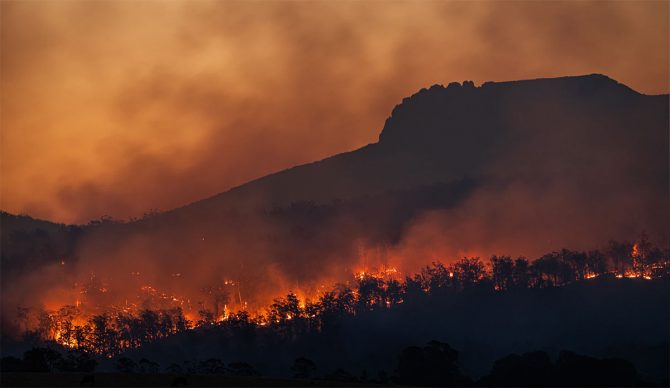
Researchers have found there is a 66 percent chance that we’ll break the climate threshold in the next five years. Photo: Matt Palmer//Unsplash
For years now, scientists have been sounding the alarm about our rapidly warming planet. According to a new report from the World Meteorological Organization (WHO), there’s a 66 percent chance that the oft-touted 1.5-degree Celsius (2.7-degrees Fahrenheit) global warming threshold will be passed in the next five years. While that is definitely not good news, it does come with a caveat: it will likely be temporary — unless we rein things in.
Very quickly, that 1.5C threshold is so important because it means that the world will be that much warmer than it was before we started belching vast amounts of fossil fuel emissions into the atmosphere. It’s the number all the countries involved in the Paris Agreement decided upon back in 2015.
“Going over 1.5C every year for a decade or two would see far greater impacts of warming, such as longer heatwaves, more intense storms and wildfires,” wrote the BBC. “But passing the level in one of the next few years would not mean that the Paris limit had been broken. Scientists say there is still time to restrict global warming by cutting emissions sharply.”
In 2020, the World Meteorological Organization said there was less than a 20 percent chance of breaking that barrier in the five years ahead. They redo the number each year, just to see if we’re on track, and we’re not. By last year, that 20 percent had increased to 50 percent, and this year, it’s even higher.

That red is bad. Image: Met Office
The 1.5C mark isn’t exactly a measurement of the world’s temperature. Instead, it’s a measure of how much the Earth has warmed in comparison to long-term global averages. Using temperature data from 1850-1900, just after the years generally thought of as the Industrial Revolution. From about 1760 to 1840, we transitions from creating goods by hand to using machines. And in the years after, our reliance on coal, gas, and oil has only increased. For a long time, that 1.5C threshold — when we’ve tipped past the point of no return that would have devastating consequences — was thought to be around 2.0C. But in 2018, scientists realized they’d overshot and revised it to 1.5C.
“There’s been flooding in many parts of the world, there’s been droughts across the world, [and] they are increasing in frequency these extreme temperatures,” Leon Hermanson, a Met Office scientist who worked on the report, told Al Jazeera. “We’re even seeing extreme snowfall in regions, because although it needs to be cold to snow, there are also more areas which previously were too cold to have much moisture in the air – and now they’re seeing a lot of snow.”
Global temperatures are set to reach new records in the next five years, says new #StateofClimate update from WMO and @metoffice:
?https://t.co/4PpgpKo9Hd pic.twitter.com/GSn41DWphB— World Meteorological Organization (@WMO) May 17, 2023
But despite researchers warning the world that we’re teetering on creating a planet that’s not exactly comfortable to live on, we’ve done almost nothing to stop it. Our need for creature comforts, fuel guzzling vehicles, and the general greed of corporations whose sole purpose is to make money has pushed up temperatures to record heights. In 2016, before the three consecutive La Niña years that helped ease the heat, global temperatures were 1.28C above the pre-industrial figure. And now that we’re staring down the barrel of an El Niño event that’s forecasted to be particularly brutal, researchers are nearly certain that the 1.28C mark will be surpassed by 2027.
“We really are now within reach of a temporary exceedance of 1.5C for the annual mean temperature, and that’s the first time in human history we’ve been that close,” said professor Adam Scaife, head of long range forecasts at the Met Office. “I think that’s perhaps the most stark and obvious and simplest statistic that we’ve got in the report.”
The scientists did temper their report a bit. They stressed that temperatures would have to stay at or above 1.5C for two decades for the Paris agreement threshold to be officially broken.
“This report does not mean that we will permanently exceed the 1.5C level specified in the Paris Agreement which refers to long-term warming over many years,” said WMO Secretary-General Prof. Petteri Taalas. “However, WMO is sounding the alarm that we will breach the 1.5C level on a temporary basis with increasing frequency.”

